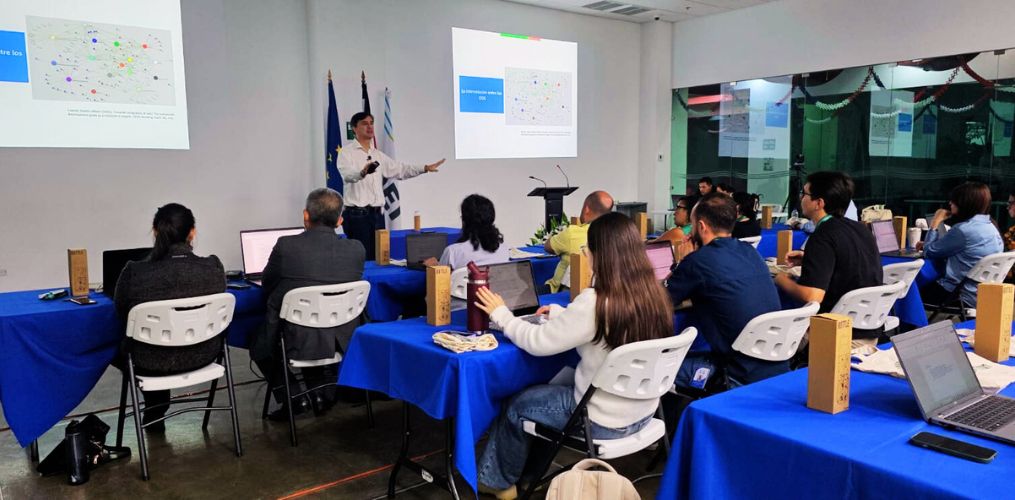
From 22 to 26 September 2025, the EULAC ENERGYTRAN project delivered the e-learning Course “Environmental Challenges and Open Science – an approach to Innovation and Technology” in San José, Costa Rica.
Organised in a hybrid format, with in-person sessions hosted at the Centro Nacional de Alta Tecnología (CeNAT) and streamed online, the event brought together a wide range of countries and institutions from across Latin America and Europe.
The course was designed to train professionals in the principles and practices of Open Science, and potential applications to tackle global issues such as climate change, biodiversity loss, and ecosystem degradation. Experts from EU-LAC shared knowledge, tools and case studies demonstrating how Open Science fosters collaboration, accelerates discovery, and strengthens inclusive participation to research.
The programme combined both international and regional perspectives. Guillermo Anlló from UNESCO opened the presentations with a reflection on the role of Open Science, and the urgent need for a cultural shift. Giulia Malaguarnera (University of Minho/OpenAIRE, Portugal) showed how Open Science has become institutionalised in Europe, supported by infrastructures like OpenAIRE and EOSC, highlighting ongoing debates on research assessment. Andrea Mora Campos (Universidad Nacional de Costa Rica) offered the Latin America’s perspective through the description of its community-driven model, built on non-commercial open access and strong networks like La Referencia and SciELO.
The second day featured a session on open software by Kevin Moraga García (Instituto Tecnológico de Costa Rica), with contributions from Diana Andone (UPT Timisoara, România) and Ricardo Andrade, Alexandre Lucas, and Carlos Silva (INESCTEC, Portugal), who showcased open tools, repositories, and practical applications.
The focus of the third shifted to infrastructures and capacity building. Tania Altamirano (RedCLARA) presented digital ecosystems in Latin America, Allan Campos (CeNAT, Costa Rica) highlighted the benefits of Open Science for early-career researchers, and Radu Vasiu (UPT Timisoara) examined publication impact and quality methods.
The fourth day explored the application of Open Science to biodiversity and environmental sciences, with Francisco Pando (GBIF, Spain) and Julio Paneque (LifeWatch ERIC, Spain) presenting FAIR data and a range of biodiversity-related tools.
Finally, the closing day turned to social participation and citizen science. Rafael Corrales (UNESCO, Costa Rica) emphasised the integration of scientific, local, and Indigenous knowledge, while Valeria Arza (UNSAM, Argentina) shared experiences of citizen science initiatives from the region.
This course, one of the deliverables of the ENERGYTRAN project, was the result of a joint effort between CeNAT, OEI, INESCTEC, IPS, and LifeWatch ERIC to promote a model of science that is more collaborative, transparent, and accessible to all.